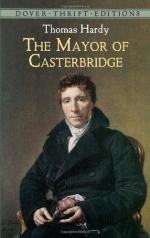“Mr. Michael Henchard. Not to be opened till Elizabeth-Jane’s wedding-day.”
The latter sat up with her mother to the utmost of her strength night after night. To learn to take the universe seriously there is no quicker way than to watch—to be a “waker,” as the country-people call it. Between the hours at which the last toss-pot went by and the first sparrow shook himself, the silence in Casterbridge—barring the rare sound of the watchman—was broken in Elizabeth’s ear only by the time-piece in the bedroom ticking frantically against the clock on the stairs; ticking harder and harder till it seemed to clang like a gong; and all this while the subtle-souled girl asking herself why she was born, why sitting in a room, and blinking at the candle; why things around her had taken the shape they wore in preference to every other possible shape. Why they stared at her so helplessly, as if waiting for the touch of some wand that should release them from terrestrial constraint; what that chaos called consciousness, which spun in her at this moment like a top, tended to, and began in. Her eyes fell together; she was awake, yet she was asleep.
A word from her mother roused her. Without preface, and as the continuation of a scene already progressing in her mind, Mrs. Henchard said: “You remember the note sent to you and Mr. Farfrae—asking you to meet some one in Durnover Barton—and that you thought it was a trick to make fools of you?”
“Yes.”
“It was not to make fools of you—it was done to bring you together. ’Twas I did it.”
“Why?” said Elizabeth, with a start.
“I—wanted you to marry Mr. Farfrae.”
“O mother!” Elizabeth-Jane bent down her head so much that she looked quite into her own lap. But as her mother did not go on, she said, “What reason?”
“Well, I had a reason. ’Twill out one day. I wish it could have been in my time! But there—nothing is as you wish it! Henchard hates him.”
“Perhaps they’ll be friends again,” murmured the girl.
“I don’t know—I don’t know.” After this her mother was silent, and dozed; and she spoke on the subject no more.
Some little time later on Farfrae was passing Henchard’s house on a Sunday morning, when he observed that the blinds were all down. He rang the bell so softly that it only sounded a single full note and a small one; and then he was informed that Mrs. Henchard was dead—just dead—that very hour.
At the town-pump there were gathered when he passed a few old inhabitants, who came there for water whenever they had, as at present, spare time to fetch it, because it was purer from that original fount than from their own wells. Mrs. Cuxsom, who had been standing there for an indefinite time with her pitcher, was describing the incidents of Mrs. Henchard’s death, as she had learnt them from the nurse.




